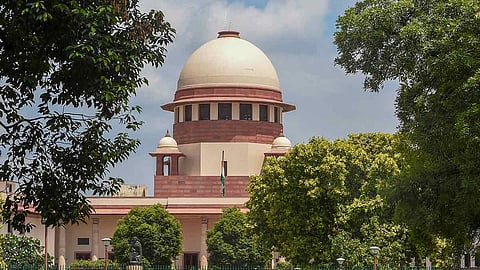

Follow TNM’s WhatsApp channel for news updates and story links.
The Supreme Court, on Thursday, August 22, questioned the Union government on whether the court, as custodian of the Constitution, should remain powerless if Governors indefinitely withhold assent to Bills passed by elected State legislatures.
Chief Justice of India BR Gavai, heading a five-judge Presidential Reference Bench, asked Solicitor General Tushar Mehta, “If a Governor does not do what the Constitution mandates him to do and sits over a Bill for years, should courts be powerless to examine such inaction? What happens to the will of the people and the democratic set-up of government?”
The CJI was responding to Mehta’s contention that delays by Governors are matters for “political solutions” and not judicial intervention. The Solicitor General submitted that “not every problem needs to be resolved by the Supreme Court.” adding that Chief Ministers could approach the Prime Minister or the President to persuade Governors. He warned that prescribing judicial timelines would violate the principle of separation of powers and lead to “constitutional chaos.”
The bench, also comprising Justices Surya Kant, Vikram Nath, PS Narasimha and AS Chandurkar, however, pressed the Union government on the implications of prolonged inaction. Justice Narasimha asked, “If the Governor does not take any action for a very long period, can the situation be remediless? There cannot be a vacuum in the Constitution.”
According to The Hindu, the CJI reminded the government that the Court had previously struck down the 42nd Amendment when it limited judicial review, and asked, “Can we now say this court is powerless in the face of inaction by a Governor?” He further observed, “Suppose the Governor sits over Bills for four years, what happens to the democratic set-up and the will of a two-thirds majority legislature?”
LiveLaw reported that the bench warned indefinite withholding of assent would make the legislature “totally defunct.” The CJI noted, “The Assembly, elected by a majority, unanimously passes a Bill, if the Governor does not exercise the proviso under Article 200, it will be making the legislature defunct.”
Mehta maintained his stand, insisting that Governors enjoyed a distinct constitutional position and that remedies lay in the political sphere. “Solutions lie elsewhere, solutions lie in the political sphere. This Court is the custodian of the Constitution, but there are problems which are not solvable by this Court,” he said.
Earlier this week, the bench had asked what is the recourse available if the Governor keeps Bills pending. The court was examining a reference made by President Droupadi Murmu on whether timelines could be fixed for Governors and the President in dealing with Bills. The reference followed the Court’s April 8 ruling in the Tamil Nadu Governor case, where timelines were prescribed for the first time.
The hearing will continue next Tuesday.